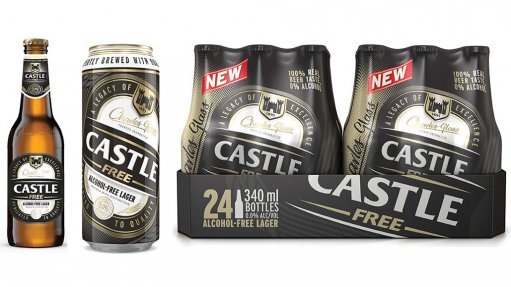
There has been increased demand for Johannesburg-headquartered brewery South African Breweries’ (SAB’s) non-alcoholic Castle Free beer and this trend has continued despite the lifting of the ban on alcohol sales.
“Consumers have had the chance to trial Castle Free during the ban on alcohol sales and we have gained new consumers as a result,” says Castle Free marketing manager Matthew Scarlett.
Before the start of the lockdown in March last year to prevent the spread of Covid-19, SAB experienced small but steady growth in demand. However, during hard lockdown, the company experienced a surge in demand and was excited by the opportunity presented by a larger customer base consuming Castle Free.
“As more consumers are making a zero-alcohol beer part of a regular social occasion, we look forward to improved growth for the brand,” states Scarlett, highlighting that SAB is well placed to meet the increase in demand.
While only registering on some consumers’ radars owing to last year’s ban on alcohol sales, Castle Free was officially introduced in 2017 after SAB realised that there was a gap in the market, owing to a shift in consumers looking for a non-alcoholic alternative.
Available in a 340 ml bottle and 500 ml can, extensive consumer engagement and product testing was undertaken before settling on what Castle Free is today.
An Anheuser-Busch InBev subsidiary, SAB also leveraged its global network of brewers, innovation and insights teams to trial and develop the non-alcoholic beer.
While Scarlett notes that there are always challenges when developing a new product, SAB was positive it could overcome these and develop the first locally produced 0% alcohol beer in Africa.
The non-alcoholic beer is brewed and packaged at SAB’s Chamdor brewery in Johannesburg.
Brewed containing alcohol, Castle Free undergoes vacuum distillation to remove the alcohol content, which enables the beverage to taste, look and embody the aroma associated with an alcoholic counterpart.
“Castle Free has ‘real beer’ flavour and is proudly part of the Castle family,” highlights Scarlett.
Much like Castle Lager, all associated packaging and raw materials used in the production of Castle Free are 100% home grown.
“While we do strive for zero waste at our production facilities, all Castle Free packaging materials are of a virgin nature. Raw materials used in the brewing process are upcycled, and all ‘waste materials’ are managed in a socially responsible manner,” emphasises Scarlett.
Producing more than two-million bottles in a month, SAB ramped up production of Castle Free during the sales ban to meet the increased demand for non-alcoholic alternatives, but its production still pales in comparison with that of Castle Lager.
“Castle Lager is produced across all seven of our breweries nationally, as well as in many countries across Africa. Castle Free is yet to be expanded to other breweries, although consideration for this is being given,” explains Scarlett, adding that Castle Free is more costly to produce than Castle Lager owing to the process used to remove alcohol from the beer.
Although it is more expensive to produce, SAB is confident in its growth plans for Castle Free.
The non-alcoholic beer is currently not being exported; however, making Castle Free available in other countries across Africa is under discussion.
“Castle Free is part of our communication for moderate alcohol consumption as well as changing social norms and behaviours. We will continue to promote Castle Free in local markets as part of everyday social occasions,” concludes Scarlett.